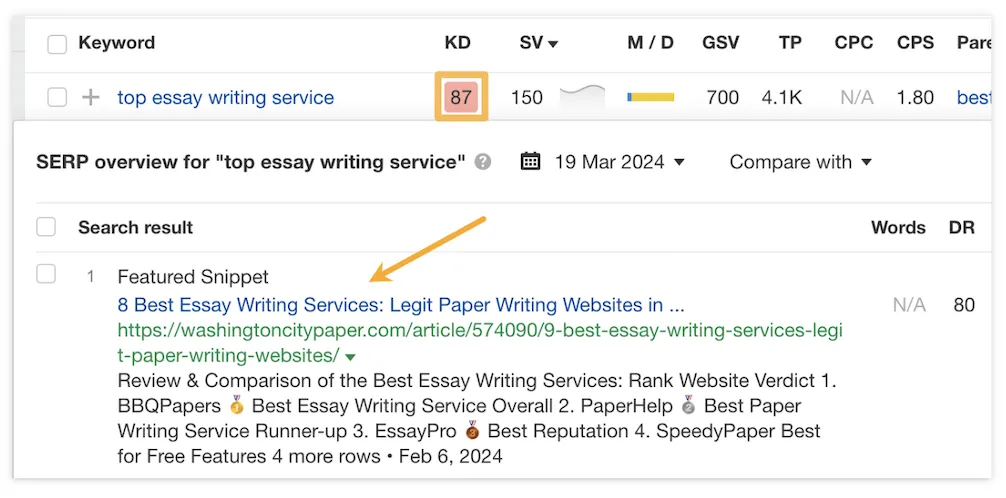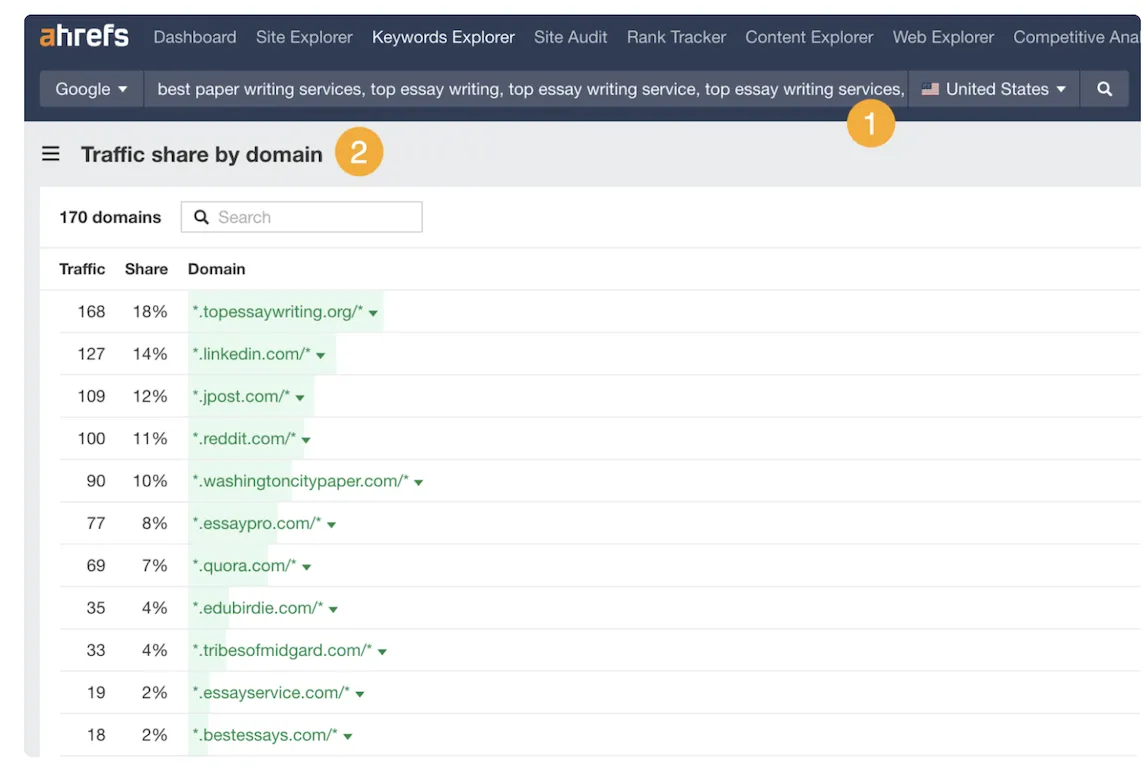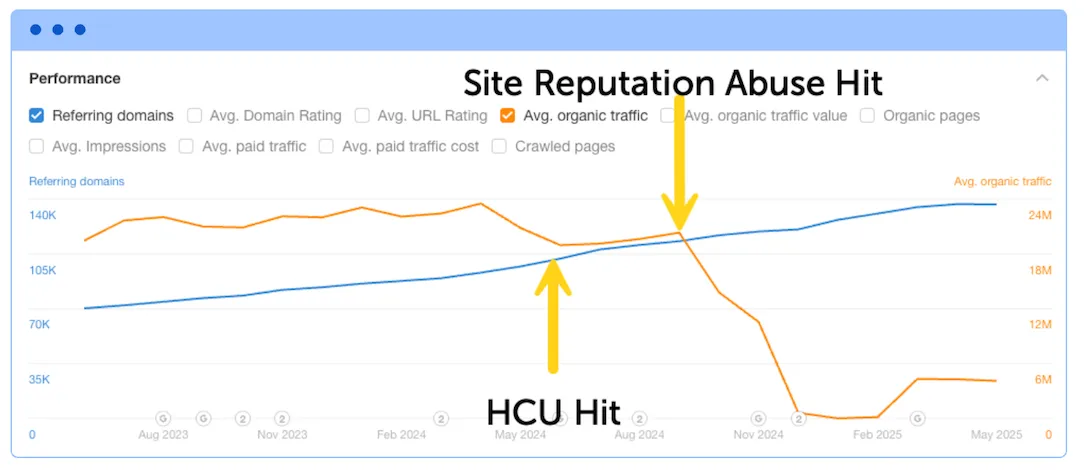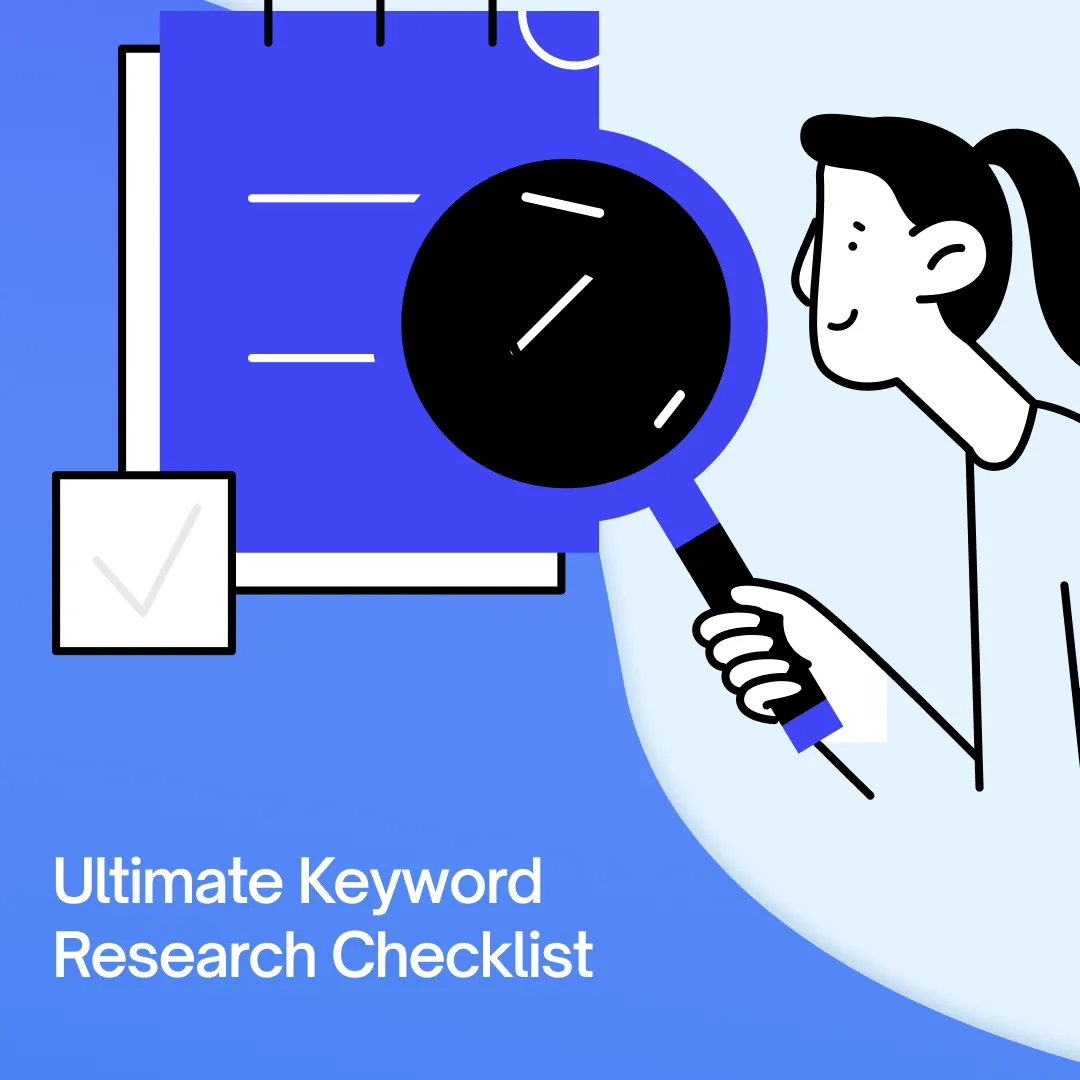Parasite SEO is still alive in 2025, and it’s as tempting as ever.
Instead of waiting months to build authority on your own site, you can publish on high-authority platforms like Medium or LinkedIn, and borrow their domain authority (DA) to rank fast.
Done right, it can send real traffic your way. Some parasite SEO posts have pulled in hundreds of thousands of visits almost overnight.
But there’s a catch.
Since Google’s March 2024 update targeting Site Reputation Abuse, the tactic now walks a fine line between clever shortcut and costly SEO penalty. One misstep, and you risk getting buried, or worse, deindexed entirely.
Parasite SEO reflects a bigger shift in 2025.
Google is rewarding content that demonstrates real relevance and user value, no matter where it’s published. That means thin, affiliate-heavy posts disappear fast, while content that’s original, timely, and aligned with search intent can hold rankings longer, even on borrowed domains.
That’s why this post is your straight-shooting guide to parasite SEO in 2025.
We’ll cover how it works, why it’s appealing, the pros and cons, and Google’s stance today. Think of it as your reality check: when this strategy makes sense as a short-term SEO play, and when it’s more likely to blow up your long-term growth.
TL;DR:
- Parasite SEO is still effective in 2025 for fast rankings by publishing on high-authority sites such as Medium, LinkedIn, or Reddit.
- Google’s March 2024 Site Reputation Abuse update increased risks, making low-value or affiliate-heavy content vulnerable to penalties and deindexing.
- Examples show both successes and failures: Forbes contributor posts, USAToday coupon hubs, Outlook India’s black-hat streaming page, and Washington City Paper’s gray-hat essay service roundup.
- How it works: choose low-competition long-tail keywords, publish on trusted platforms, add links and CTAs, then monitor results with analytics tools.
- Benefits include rapid rankings, low-cost visibility, access to built-in audiences, easier link building, and brand trust through association.
- Risks include penalties, damaged credibility, limited control over content, ethical issues, and possible legal consequences involving copyright or trademarks.
- Parasite SEO is best for testing keywords, short-term visibility, and campaigns with fast traffic needs. Traditional SEO remains the path for long-term authority and sustainable growth.
- Smart strategies combine both: use parasite SEO for speed, and traditional SEO to secure durable rankings and brand equity.
What Is Parasite SEO?
Building domain authority on your own site takes time. It involves months or even years of content, backlinks, and technical work. Parasite SEO lets you skip the wait. Instead of publishing on your domain, you post on high-authority platforms like Medium, LinkedIn, or Reddit, letting their DA push your content into the search engine results.
It’s not guest posting or backlink building.
You’re ranking content directly on someone else’s site. That makes it a go-to for quick wins tied to affiliate campaigns, product launches, or trending keywords. And in 2025, it’s still effective. Publishing on a trusted domain can help you outrank newer sites that haven’t built authority yet.
Insider tip: If you try parasite SEO, don’t churn out filler. Use AI tools like Jasper or Grammarly to sharpen your writing, but focus on content that’s useful, specific, and aligned with the host platform’s tone. That’s what keeps your posts indexed and visible longer than the average churn-and-burn attempt.
Examples of Parasite SEO
Even with Google’s crackdowns, parasite SEO is still a go-to move for growth marketers chasing fast visibility. Here are four real-world examples that show how it works, and where it can backfire.
1. Forbes Marketplace & Contributor Posts
Marketers leaned hard on Forbes’ authority, publishing “expert POVs” and product roundups that ranked fast.
Here’s an example:

But by late 2024, Google flagged much of this as site reputation abuse, and Forbes pulled back parts of its contributor and freelance programs to stay compliant.
2. Affiliate Pages on News Subdomains
Coupon hubs like Coupons.USAToday and Coupons.BusinessInsider were loaded with affiliate offers and thin content.
For a while, they ranked on the back of their parent domains’ authority. But Google’s updated policies hit them hard, making them textbook examples of parasite SEO gone too far.
3. Outlook India’s “Free Movie Streaming Sites” Page
This was a classic black-hat move, according to a 2024 post from Ahrefs. Outlook India published a “best free movie streaming sites” post that raked in between 25 K and 377 K organic visits per month just months after launch.
It capitalized on quick authority gains, but in September 2023, Google penalized the page because it was clearly masked sponsored content. As a result, the page’s traffic cratered.
Why it’s black hat:
- Undisclosed sponsorship: The article pretended to be editorial but was secretly an advertorial for shady movie-streaming sites.
- Linking to dodgy/illegal services: Promoting unlicensed streaming services violates both Google’s guidelines and copyright law.
- Deceptive intent: The goal was not to inform but to funnel traffic into questionable platforms.
- Low-quality content: “Absolute trash” filler content designed purely to rank and redirect.
4. Washington City Paper’s “Essay Writing Service” Post
Ahrefs also mentions this case, but this time as a gray-hat example.
A sponsored post on Washington City Paper targeted the high-competition keyword “top essay writing service.”
Leveraging the site’s strong authority (DA 80), the page ranked quickly and drove an estimated 2.7K organic visits per month.
It became a go-to case study for how parasite SEO can push competitive affiliate content into the SERPs, until Google’s algorithm updates put such plays under scrutiny.

So why is this case grey hat SEO, while the previous one is a black-hat tactic?
- Legit site, shady use: Washington City Paper is a legitimate news outlet (DR 80). But the page was essentially rented out to host a sponsored “Top essay writing services” roundup.
- Affiliate monetization: The list was stuffed with affiliate links, but not necessarily to illegal services. These were legit essay-writing businesses.
- Still misleading, but not outright fraud: It blurs the line by exploiting site reputation, but it’s not linking to unindexed/shady/illegal sites like in the previous black-hat case.
How Does Parasite SEO Work?
When you need fast rankings but don’t have time to build domain authority, parasite SEO offers a shortcut. You publish on a trusted platform and let its authority carry your content into the SERPs and we already shared examples of that.

So, here’s how you can do it in a legitimate way to attract more organic traffic and feature your company in search engine results:
Step 1: Pick the Right Keywords
Target long-tail keywords that have a lower keyword difficulty and still a pretty decent search volume. These are also the types of keywords your audience is more likely to use in their search queries.
Step 2: Publish on a High-DA Host
Drop content on platforms like Medium, LinkedIn, Quora, or Reddit. Search engines already trust these domains, so your post gets indexed and ranked far quicker than on your own site.
Start by researching where competitors’ parasite posts are ranking, first.
Tools like Majestic or Ahrefs will show you which high-DA platforms are already indexed for your keywords.
Then assess how you can actually publish there.
Some sites are open and self-serve, like Medium or LinkedIn; others require pitching editors, or even paying for sponsored slots on trusted outlets.
Once you know the route in, adapt your article to the host’s audience style.
A Reddit post needs a conversational hook, while LinkedIn expects professional polish. The goal isn’t to clone your original piece, but to craft a version that fits the host platform while still targeting your chosen keyword.
Step 3: Add Links & CTAs
Even if the SEO value stays with the host, links back to your landing page can drive referral traffic and conversions.
Step 4: Monitor Results
Use Google Analytics or Google Search Console to track rankings and clicks. If it starts ranking, support it with light link building (social shares, tier-2 backlinks). If visibility drops, it may signal policy changes or a Google flag.
Why Does Parasite SEO Work?
Publishing on high-authority platforms works because they come with strong backlink profiles, built-in traffic, and constant crawling by Google. Your content benefits from “borrowed credibility,” which smaller sites can’t match.
- Instant trust: Pages rank faster without months of link-building.
- Built-in traffic: Active user bases boost discoverability.
- Less link building: The host’s authority does the heavy lifting.
- Fast indexing: Content can hit search in days. This is ideal for affiliate promos or product launches.
The trade-off for speed is less control.
Hosting on external platforms means that if rules change or domains get hit by Google’s Site Reputation Abuse update, your rankings can disappear overnight.
Forbes’ shutdown of its “Vetted” contributor program is proof of this.
One day, a central parasite SEO channel, the next it was gone. That’s why smart SEOs use it to test keywords or spike short-term traffic, but keep building authority on their own domains for stability.
Advantages of Parasite SEO
Despite the risks, parasite SEO remains attractive for marketers chasing fast wins. Here’s why it stays in the playbook for growth, affiliate, and SEO teams in 2025:
- Fast search rankings: Publishing on high-authority platforms like Medium, LinkedIn, or Reddit can land content on page one within days, bypassing the slow grind of building domain authority. According to Neil Patel’s research, it can take over one year to grow your domain authority from low to high. But the higher your DA is, the longer it takes to grow it.
- Cost-effective visibility: Unlike PPC or long-term SEO campaigns, parasite SEO is lean. Many platforms are free to publish on, making it a low-cost way to test SERP traction before committing budget. And that’s exactly what you need because growth-stage teams can invest $5000-$25,000 per month just for SEO.
- Built-in audiences: Sites like Reddit and LinkedIn bring active communities. Post relevant content, and you gain search visibility plus immediate engagement, shares, and referral traffic.
- Easier link building: Authority domains are more likely to attract natural backlinks from readers or aggregators, boosting credibility and sending extra traffic without heavy outreach. Besides, as Neil Patel also mentions, you need over 23,000 (preferably high-quality, do-follow) links to get your DR in the mid to high 80s. And that’s not a walk in the park, especially if you’re not stellar at link-building outreach.
- Brand trust by association: Showing up on trusted platforms builds authority. Readers and Google, are more likely to take your brand seriously when it’s attached to well-known sites.
Parasite SEO Risks and Challenges
Parasite SEO gets you speed, but on borrowed ground. Since Google’s March 2024 Site Reputation Abuse update, the risks are bigger than ever.
Potential for Penalties
Google now targets third-party content published only to exploit a host’s DA, even if the platform approved it. Chris Nelson of Google’s Search Quality team made it clear that using third-party content on a site in an attempt to exploit the site’s ranking signals is a violation.
And the fallout is real. Forbes suspended its contributor model, European publishers saw steep traffic drops, and outlets like Meraki Group filed antitrust complaints after affiliate hubs were penalized. If your content looks like a shortcut without value, Google will flatten it.
Reputation Damage
Parasite SEO can burn trust as quickly as it builds traffic. Users feel misled, hosts risk penalties, and your brand credibility suffers. Big names prove the point: Forbes Advisor lost 83% traffic, while CNN Underscored and WSJ Buy Side dropped over 25%.
Thin, affiliate-heavy content isn’t just risky. It’s reputational damage waiting to happen.

Limited Control
Publishing on LinkedIn, Medium, or Reddit means you don’t control the rules. Hosts can change policies, pull content, or noindex subdirectories, instantly killing your rankings.
After Google’s crackdown, many platforms quietly deindexed affiliate sections, leaving contributors invisible overnight.
Ethical Considerations
Parasite SEO lives in a gray area. Publishing relevant, user-focused content on trusted domains can work. But spammy, keyword-stuffed posts are exactly what triggered Google’s crackdown. The takeaway: value wins, shortcuts lose.
Legal Implications
Beyond rankings, parasite SEO can expose you legally.
- Copyright: Publishing parasite SEO content involves scraping or recycling images, graphics, or even full articles in most cases when it’s done poorly. Using unlicensed stock photos or copying text from competitors is a severe legal risk. Copyright holders can file DMCA takedowns, which can escalate into statutory damages of up to $150,000 per infringement under U.S. law. And if that fine isn’t enough, know that repeat violations can get entire domains flagged.
- Trademarks: Misusing competitor brand names in parasite content is a shortcut that can backfire badly. Courts have consistently held that hijacking trademarks for SEO is misleading. For example, the classic Brookfield Communications v. West Coast Entertainment case (9th Cir. 1999) wasn’t about parasite SEO as we know it today. However, it dealt with a company embedding a competitor’s trademark (“MovieBuff”) in its metatags to hijack search traffic. The court ruled this created “initial interest confusion,” a form of trademark infringement where users are misled into visiting the wrong site. While parasite SEO is a different tactic,: if your parasite page leans on competitor marks to rank (e.g., “Best [Competitor] Alternatives”), you’re not just risking a Google penalty, you could be opening yourself up to trademark claims.
- Blowback: Even if you dodge copyright or trademark lawsuits, you’re still vulnerable to legal and reputational blowback. Brands whose names are misused in metatags or affiliate roundups can send cease-and-desist letters. And if you ignore them, it can quickly spiral into costly litigation. Legal fees, settlements, and the distraction of dealing with compliance issues can easily outweigh any ranking gains. On top of that, being labeled as manipulative in public court filings can tank credibility with clients, partners, and search engines alike.
Long-Term Impact on SEO Strategy
Parasite SEO rarely ages well. It’s volatile, host-dependent, and declining in effectiveness as platforms tighten controls. Many marketers now use it only for testing or short-term traction, while investing in sustainable SEO with original content, earned links, and long-term authority.
Bottom line: Parasite SEO works best as a launchpad, not a business model. The real wins come when you control the platform, the content, and the audience.
Parasite SEO vs. Traditional SEO
In 2025, SEO strategy isn’t just about what works; it’s about when you use it. Parasite SEO is fast and flexible, built for quick visibility on high-authority platforms. Traditional SEO is slower but steadier, focused on owning long-term growth. The smartest move? Knowing when to deploy each.
Parasite SEO works when:
- You’re testing keywords or a new market. Because the host site already has authority, you can rank quickly and see if a keyword has commercial value before investing in your own site’s SEO.
- You need fast visibility (launches, seasonal, affiliate). You can rank in days on a DR 90 domain vs. months on your own.
- You want low-cost traffic without heavy investment. Of course, many high-DA hosts require paid placements (sponsored posts, councils, marketplaces).
Traditional SEO works when:
- You’re building a brand, not just a campaign
- You want to own rankings and links long-term
- You’re focused on authority, trust, and conversions
The best SEOs blend both: use parasite SEO to validate fast, and traditional SEO to scale and sustain.
Comparative Analysis
Here’s how parasite SEO and traditional SEO stack up across the core pillars of search strategy:
Bottom line: Parasite SEO gives speed. Traditional search engine optimization gives staying power. Use each with intent.
Integration with Broader Strategies
Smart SEO leaders combine both to maximize reach:
- Tactical campaigns: Parasite SEO shines for launches or event-driven promos.
- Channel authority: Use third-party platforms to send traffic and links back to your site.
- Expand reach: Parasite posts broaden your visibility while your site grows.
- Guide evergreen strategy: Test keywords with parasite SEO, then scale proven winners on your domain. Of course, make sure they fit your content clusters.
- Future-proof: As Google tightens rules, your own site should remain the foundation.
Best practice: Pair parasite SEO’s speed with traditional SEO’s durability to build both reach and resilience. Of course, make sure that when you’re publishing on other websites, you’re mindful of content quality and user intent; avoid black hat techniques and AI generated content as much as possible.
Future-Proof Your SEO Campaigns with Bluethings
Parasite SEO is fast, but speed alone won’t build a sustainable presence.
As this guide makes clear, relying solely on high-authority platforms leaves you vulnerable to platform policy shifts, Google penalties, and disappearing rankings. The SEO winners in 2025 are those who balance agility with durability.
At Bluethings, we help marketers build SEO strategies that last.
Whether you're using parasite SEO as a quick-win tactic or investing in long-term growth through content, link building, and technical optimization, we design campaigns that align with your industry, audience, and goals.
Of course, we combine short-term visibility with long-term equity, so every move compounds value rather than fading out.
What We Help You Build:
- Fast organic visibility through a high-authority platform plays
- Long-term search rankings by strengthening your own domain authority
- User-focused SEO that survives, and thrives, through every algorithm update
- AI-aligned optimization: from Answer Engine Optimization to GEO strategy integration
Backed by a team of SEO analysts, content strategists, and integrated AI tools, we don’t chase rankings; we build visibility that scales and endures.
Ready to go beyond shortcuts and build an SEO strategy for the long haul? Contact Bluethings today for a custom plan built for 2025 and beyond.
FAQ
What is Parasite SEO and why does it matter for content creators?
Parasite SEO is the practice of publishing content on high-authority third-party sites (like news outlets, content aggregation platforms, or LinkedIn articles) to rank faster than your own domain might.
How does Parasite SEO interact with Google’s trust signals and the E-E-A-T framework?
Parasite posts don’t exempt you from Google’s quality standards. To build brand authority, focus on E-E-A-T: show expertise, provide original insights, and avoid thin content aggregation. Many site managers now use AI content tools to generate drafts for guest posts. While AI accelerates content creation, remember that Google’s spam policies still apply. Adding author bios, targeting conversational AI queries, and content personalization reduce the risk of penalties.
Can parasite SEO drive results in a zero-click content environment?
Absolutely. Even if Google surfaces zero-click content in SERPs, parasite posts on high-DA sites can still capture attention and clicks because users trust the platform. Combined with a strong user experience, this builds pathways back to your brand.

.webp)


